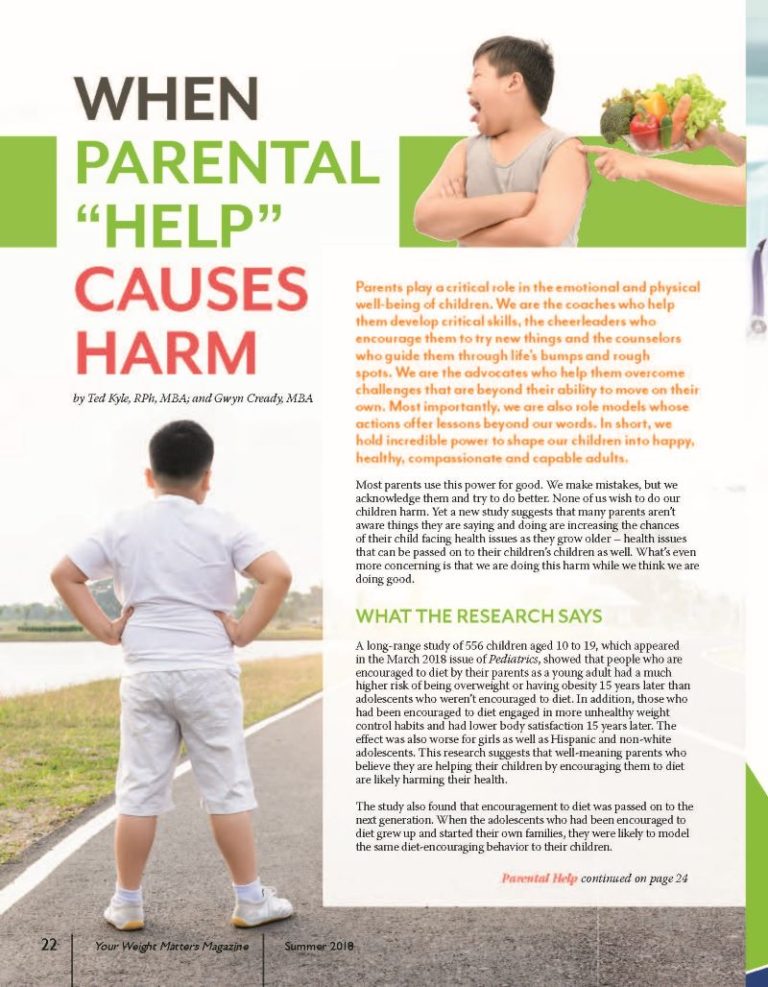When Parental “Help” Causes Harm


by Ted Kyle, RPh, MBA; and Gwyn Cready, MBA
Summer 2018
Parents play a critical role in the emotional and physical well-being of children. We are the coaches who help them develop critical skills, the cheerleaders who encourage them to try new things and the counselors who guide them through life’s bumps and rough spots. We are the advocates who help them overcome challenges that are beyond their ability to move on their own. Most importantly, we are also role models whose actions offer lessons beyond our words. In short, we hold incredible power to shape our children into happy, healthy, compassionate and capable adults.
Most parents use this power for good. We make mistakes, but we acknowledge them and try to do better. None of us wish to do our children harm. Yet a new study suggests that many parents aren’t aware things they are saying and doing are increasing the chances of their child facing health issues as they grow older – health issues that can be passed on to their children’s children as well. What’s even more concerning is that we are doing this harm while we think we are doing good.
What the Research Says
A long-range study of 556 children aged 10 to 19, which appeared in the March 2018 issue of Pediatrics, showed that people who are encouraged to diet by their parents as a young adult had a much higher risk of being overweight or having obesity 15 years later than adolescents who weren’t encouraged to diet. In addition, those who had been encouraged to diet engaged in more unhealthy weight control habits and had lower body satisfaction 15 years later. The effect was also worse for girls as well as Hispanic and non-white adolescents. This research suggests that well-meaning parents who believe they are helping their children by encouraging them to diet are likely harming their health.
The study also found that encouragement to diet was passed on to the next generation. When the adolescents who had been encouraged to diet grew up and started their own families, they were likely to model the same diet-encouraging behavior to their children.
A Shift in Perception
The word “diet” itself is problematic. As a verb, people generally see “diet” as a bad thing – something to be avoided if possible. As a noun, we all have a diet that we follow day-in and day-out over the course of our life. It’s best for that diet to be a healthy, pleasurable pattern of eating. How do we rethink the way we look at the word “diet?”
Childhood obesity is a reality for one in five children. Five million young people are living with severe obesity and half a million teens are living with an eating disorder. Those of us with family members affected by this disease do want a solution.
So what can we do?
Let’s start by continuing to do what we do best – serving as our children’s coaches, cheerleaders, counselors, advocates and role models. Here are six ways the American Academy of Pediatrics (AAP) says we can leverage those roles to help prevent both obesity and eating disorders in teens:
Discourage Dieting
Model a sustainable healthy pattern for eating and steer teens away from diets that are short-term and restrictive. If you talk about food at all, talk about eating for a lifetime of health and happiness. Encourage your teen to have fun being active. Start by having fun and being active with them. Be the designer of healthy habits for your family that can last for the rest of their lives.
Promote a Positive Body Image.
Every body, every size and every shape needs love and respect. Don’t ever refer negatively to your child’s weight, body size or the amount of food they eat. If other members of the family refer to these things, stop them.
If you’re worried about your child, find a qualified healthcare provider and speak with them privately at first so that a later discussion in front of your child can remain positive and health-based. In addition, consider your relationship with your own body. If you focus on your physical imperfections, you are modeling behavior that harms your children.
Plan for Family Meals.
Make time and take time to enjoy family meals together. Fill your kitchen with wholesome, satisfying food – not food that is over-processed.
Share the joy of cooking with your children. A study published in Public Health Nutrition showed that when people cook most of their meals at home, they consume fewer carbohydrates, less sugar and less fat than those who cook fewer meals at home.
Talk Health, Not Weight.
Talking about weight can lead to body dissatisfaction, which may reinforce the idea that dieting is a permanent solution. Discussing healthy patterns and habits for living offers a more positive conversation, but remember not to overwhelm kids with this issue. Show the same concern for your own patterns and habits and take steps that move you in a healthy direction as well!
Pay Attention to Bullying and Mistreatment.
If you see clues that something is wrong, pay attention, listen and follow-up. Potential signs of being bullied include avoiding school, withdrawing from activities and relationships, earning lower grades and eating less or more.
Approach the subject of bullying gently. Children are often reluctant to admit they are being bullied. When you talk, try to listen more than you speak. If you hear something that concerns you, know that school and teachers have an obligation to help.
Seek Out Real Help for Obesity.
If your teen has a real medical issue with obesity, find qualified medical care. Self-help approaches can do more harm than good. Talk to your pediatrician. Find a qualified program that offers evidence-based treatment and specialists who understand that obesity is a biological issue – not a character flaw or the product of bad parenting. Currently, 140 pediatricians are board certified in obesity medicine across the country.
Conclusion
Even with the best intentions, “diet” encouragement can backfire. A healthy lifelong diet mindset can help. In fact, most of the tools we use as parents (encouragement, support, advocacy and unconditional love) serve our children very well. Just as we must continue to look for evidence-based options for the treatment of obesity and eating disorders, we need to look at evidence-based outcomes when it comes to the messages we send our children.
About the Authors:
Ted Kyle, RPh, MBA, is a pharmacist and health marketing expert. He is also Treasurer of the
Obesity Action Coalition (OAC).
Gwyn Cready, MBA, is a writer and branding consultant. She is also the author of nine novels and a graphic novel. Her work has appeared in Real Simple, USA Today and a number of other media outlets.
by Kendall Griffey, OAC Communications Manager Spring 2024 We have officially kicked off Your Weight Matters Regional…
Read Articleby Robyn Pashby, PhD Winter 2024 “No one is ever going to date you if you don’t…
Read Articleby Michelle “Shelly” Vicari Winter 2024 Winter has arrived! Don’t allow the chilly and damp weather to…
Read Article








